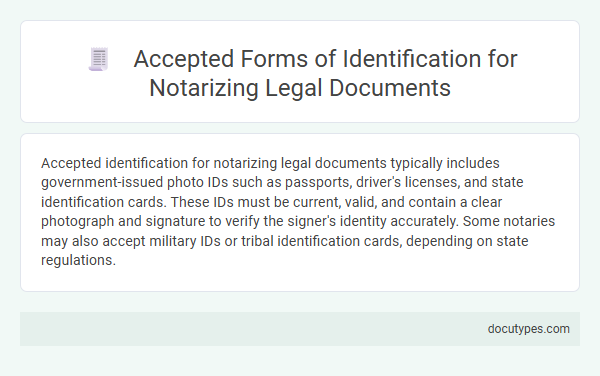Accepted identification for notarizing legal documents typically includes government-issued photo IDs such as passports, driver's licenses, and state identification cards. These IDs must be current, valid, and contain a clear photograph and signature to verify the signer's identity accurately. Some notaries may also accept military IDs or tribal identification cards, depending on state regulations.
Introduction to Notarization and Identification Requirements
Notarization is a critical process ensuring the authenticity of legal documents through official certification. Proper identification is required to verify the identity of signers, preventing fraud and maintaining legal integrity.
- Government-Issued Photo ID - Accepted forms include passports, driver's licenses, and state ID cards that display a clear photograph and signature.
- Expiry and Authenticity Requirements - Identification must be current and issued by a recognized government authority to be valid for notarization.
- Alternative Identification Forms - In some cases, secondary IDs such as military ID or permanent resident cards may be accepted when supplemented with additional documents.
Why Identification Is Crucial in Notarization
Identification plays a vital role in notarizing legal documents by verifying the signer's identity to prevent fraud. Using accepted forms of identification ensures the notarization process is legally binding and trustworthy.
- Government-Issued Photo ID - Valid passports, driver's licenses, or state ID cards are commonly accepted to confirm identity.
- Official Identification Documents - Military IDs and permanent resident cards provide additional reliable sources for verification.
- Personal Knowledge or Credible Witnesses - In some cases, notaries may rely on known individuals or witnesses to establish identity when ID documents are not available.
Your ability to provide acceptable identification safeguards the integrity of the notarized document and protects all parties involved.
Primary Government-Issued Photo IDs Accepted
Primary government-issued photo IDs accepted for notarizing legal documents include passports, state-issued driver's licenses, and state identification cards. These IDs must be current, valid, and contain a clear photograph of the individual. Acceptable identification verifies identity and prevents fraud during the notarization process.
Secondary Forms of Acceptable Identification
Secondary forms of acceptable identification for notarizing legal documents include state-issued ID cards, military identification, and passports. These documents must be current and government-issued to verify Your identity effectively.
Other acceptable secondary IDs often include permanent resident cards and tribal identification cards. Each form must contain a photograph, signature, and be valid at the time of notarization.
Special Considerations for Expired IDs
Notarizing legal documents requires valid identification to verify the signer's identity. Special consideration may be given to expired IDs depending on state laws and the notary's discretion.
- Accepted forms of identification - Government-issued photo IDs such as driver's licenses, passports, and state ID cards are commonly accepted for notarization purposes.
- Expired IDs rule - Some states may accept expired IDs if they are recently expired and the notary is able to confirm the identity through other means.
- Additional verification methods - In cases where expired IDs are used, notaries might require supplementary ID or credible witnesses to ensure the signer's identity is accurately verified.
Using Foreign Passports for Notarization
Foreign passports are widely accepted as valid identification for notarizing legal documents. They serve as official proof of identity and nationality when verifying a signer's identity.
When using a foreign passport for notarization, the document must be current and unexpired. Notaries often require the passport to include a photograph, signature, and personal details that match the signer. Some jurisdictions may request additional identification or proof of residency alongside the passport.
Identification for Minors and Special Cases
Accepted identification for notarizing legal documents typically includes government-issued photo IDs such as passports, driver's licenses, and state ID cards. For minors, identification can consist of a school ID, birth certificate, or a government-issued document accompanied by a parent or guardian's valid ID. Special cases may allow alternative forms of ID, such as military IDs or consular identification cards, depending on the notary's jurisdiction and requirements.
Unacceptable Identification Documents
Notarizing legal documents requires valid and acceptable forms of identification to verify your identity. Commonly accepted IDs include government-issued driver's licenses, passports, and state identification cards.
Unacceptable identification documents include expired IDs, student identification cards, and social security cards. These documents do not meet the security and verification standards necessary for notarization.
State-Specific Variations in Accepted IDs
What types of identification are accepted for notarizing legal documents? Accepted forms of ID vary significantly by state, often including government-issued photo IDs such as driver's licenses, state ID cards, and passports. Some states also accept military IDs or tribal identification cards to meet notarization requirements.
What Type of Identification Is Accepted for Notarizing Legal Documents? Infographic

